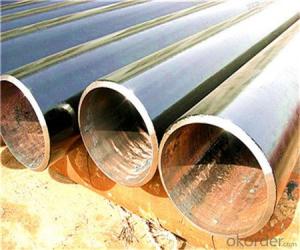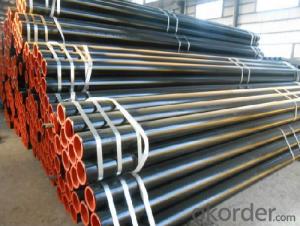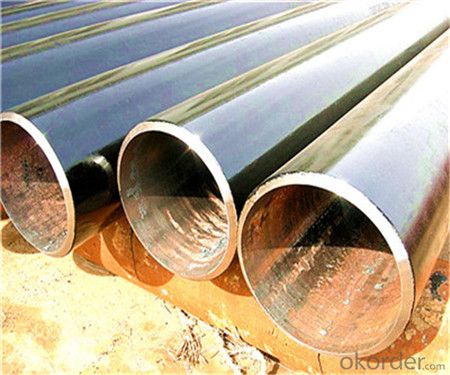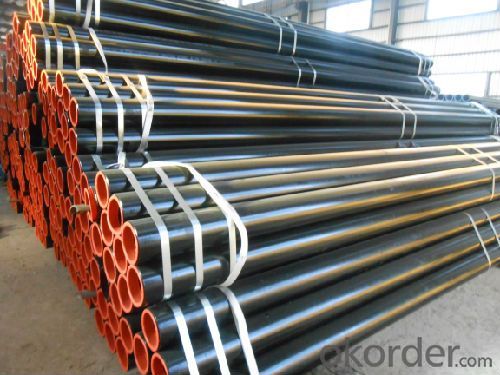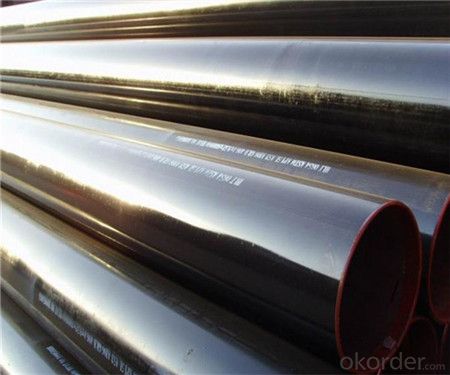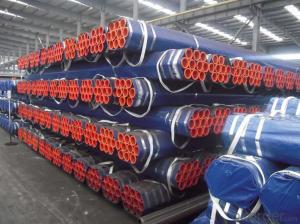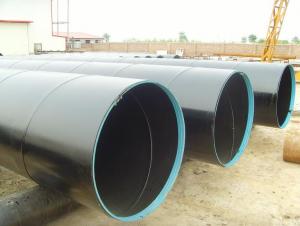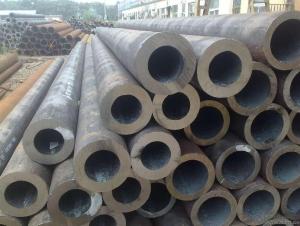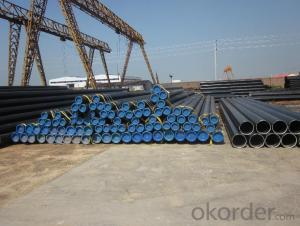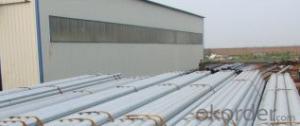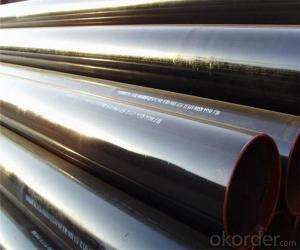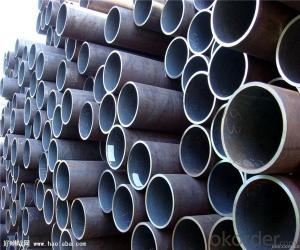Carbon Seamless Steel Pipe from CNBM Group
- Loading Port:
- Tianjin
- Payment Terms:
- TT OR LC
- Min Order Qty:
- 30 m.t.
- Supply Capability:
- 12000 m.t./month
OKorder Service Pledge
OKorder Financial Service
You Might Also Like
1、Structure of Carbon Seamless Steel Pipe API 5L of 4 Inch:
Seamless pipe is formed by drawing a solid billet over a piercing rod to create the hollow shell.
As the manufacturing process does not include any welding, seamless pipes are perceived to be stronger and more reliable.
Historically seamless pipe was regarded as withstanding pressure better than other types, and was often more easily available than welded pipe.
Standard: GB3087: Seamless Steel Tubes for Low and Medium Pressure Boiler
2、Main Features of the Seamless Pipe API 5L of 4 Inch
• High manufacturing accuracy
• High strength
• Small inertia resistance
• Strong heat dissipation ability
• Good visual effect
• Reasonable price
3、Seamless Pipe API 5L of 4 Inch Specification:
Standard | GB, DIN, ASTM ASTM A106-2006, ASTM A53-2007 |
Grade | 10#-45#, 16Mn 10#, 20#, 45#, 16Mn |
Thickness | 8 - 33 mm |
Section Shape | Round |
Outer Diameter | 133 - 219 mm |
Place of Origin | Shandong, China (Mainland) |
Secondary Or Not | Non-secondary |
Application | Hydraulic Pipe |
Technique | Cold Drawn |
Certification | API |
Surface Treatment | factory state or painted black |
Special Pipe | API Pipe |
Alloy Or Not | Non-alloy |
Length | 5-12M |
Outer Diameter | 21.3-610mm |
Grade | 20#, 45#, Q345, API J55, API K55, API L80, API N80, API P110, A53B |
Standard | ASME, ASTM |
4、Packaging & Delivery
Packaging Details: | seaworthy package,bundles wrapped with strong steel strip |
Delivery Detail: | 15-30days after received 30%TT |
5、FAQ of Seamless Pipe API 5L of 4 Inch:
①How is the quality of your products?
Our products are manufactured strictly according to national and internaional standard, and we take a test
on every pipe before delivered out. If you want see our quality certifications and all kinds of testing report, please just ask us for it.
Guaranteed: If products’ quality don’t accord to discription as we give or the promise before you place order, we promise 100% refund.
②How about price?
Yes, we are factory and be able to give you lowest price below market one, and we have a policy that “ for saving time and absolutely honest business attitude, we quote as lowest as possible for any customer, and discount can be given according to quantity”,if you like bargain and factory price is not low enough as you think, just don’t waste your time.Please trust the quotation we would give you, it is professional one.
③Why should you chose us?
Chose happens because of quality, then price, We can give you both.Additionally, we can also offer professional products inquiry, products knowledge train(for agents), smooth goods delivery, exellent customer solution proposals.Our service formula: good quality+good price+good service=customer’s trust
SGS test is available, customer inspection before shipping is welcome, third party inspection is no problem.
6、Seamless Pipe API 5L of 4 Inch Images:
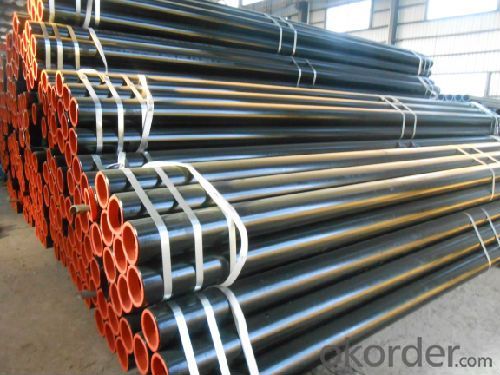
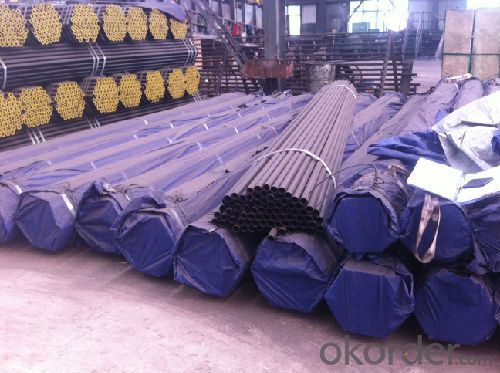
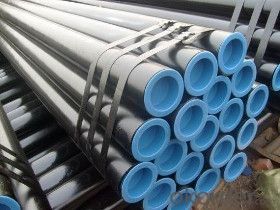
- Q: What is the role of steel pipes in the telecommunications industry?
- Steel pipes play a crucial role in the telecommunications industry as they are used for the installation of underground and overhead telecommunication cables. These pipes provide protection and support to the cables, ensuring their safety and longevity. Additionally, steel pipes are also used in the construction of communication towers and infrastructure, making them an essential component in establishing and maintaining reliable telecommunications networks.
- Q: What is the flexibility of steel pipes?
- Steel pipes are known for their exceptional flexibility, making them highly versatile and suitable for a wide range of applications. The flexibility of steel pipes refers to their ability to bend and withstand various forms of stress without breaking or deforming. This flexibility is primarily due to the inherent properties of steel, such as its high tensile strength and ductility. Steel pipes can be bent and formed into different shapes without compromising their structural integrity. This allows for easier installation and routing around obstacles, making them more adaptable for complex plumbing or piping systems. Additionally, the flexibility of steel pipes enables them to withstand external forces, such as ground movements or temperature fluctuations, without experiencing significant damage. The flexibility of steel pipes also makes them suitable for applications that require dynamic movement or expansion. For instance, in oil and gas pipelines or in heating and cooling systems, where temperature variations can cause expansion and contraction, steel pipes are able to accommodate these changes without causing leaks or failures. Furthermore, the flexibility of steel pipes contributes to their durability and longevity. The ability to withstand bending and stress helps prevent the formation of cracks or fractures that can lead to leaks or structural failures. This characteristic makes steel pipes a reliable choice for demanding environments, including high-pressure systems or corrosive conditions. In summary, the flexibility of steel pipes is a crucial attribute that allows for easy installation, adaptability to various conditions, and long-term reliability. With their exceptional flexibility, steel pipes are widely preferred in numerous industries and applications where strength, durability, and versatility are essential.
- Q: What are the different types of steel pipe coatings for underground applications?
- There are several types of steel pipe coatings used for underground applications, including fusion bonded epoxy (FBE), coal tar enamel (CTE), polyethylene (PE), and polyurethane (PU). These coatings provide corrosion protection and increase the lifespan of the steel pipes in underground environments.
- Q: How do you calculate the stress in a steel pipe?
- To calculate the stress in a steel pipe, you need to determine the applied force or load acting on the pipe and divide it by the cross-sectional area of the pipe. This will give you the stress value, which is typically measured in units of force per unit area (such as pounds per square inch or pascals).
- Q: Is there a weld on the outer wall of seamless steel tube?
- Seamless steel pipe's inner wall, outer wall, section, cross section can not see the weld seam. Because seamless steel pipe is a molding product, no late roll pressure, welding and other processes. No section, inner wall, outer wall or section, as long as there is weld, it is not seamless steel tube. The inner wall can not see the outer wall of welding seam, but it can be seen that the weld products are fake or polished goods. Some products can not be seen without friction and have weld seams on the outside wall. They are seamless treated steel tubes and are polished goods. The price is much different from the real seamless steel tube. Some bad wounding, confusing concepts, earn illegal profits.
- Q: What are the limitations of using steel pipes?
- Some limitations of using steel pipes include their susceptibility to corrosion and rust, which can affect their durability and lifespan. Steel pipes are also relatively heavy and can be challenging to transport and install compared to lighter materials. Additionally, steel pipes may require more extensive maintenance and repairs due to their vulnerability to cracks and leaks.
- Q: Can steel pipes be used for underground air supply systems?
- Yes, steel pipes can be used for underground air supply systems. Steel pipes are often used in underground applications due to their strength, durability, and resistance to external factors such as corrosion and impact. They can withstand the pressure and temperature requirements of air supply systems and can be easily installed underground. Additionally, steel pipes have a long lifespan, making them a cost-effective choice for underground air supply systems. However, it is important to consider factors such as soil conditions, potential for corrosion, and local regulations when selecting the appropriate steel pipes for the specific underground air supply system.
- Q: How are steel pipes used in plumbing systems?
- Steel pipes are commonly used in plumbing systems due to their durability and strength. They are typically used for water supply lines, sewage lines, and gas lines. Steel pipes are resistant to corrosion, making them a reliable choice for long-term use. They are often used in high-pressure systems and are known for their ability to withstand extreme temperatures. Additionally, steel pipes are easily accessible and cost-effective, making them a popular choice in plumbing installations.
- Q: What is the difference between steel pipe and aluminum pipe?
- Steel pipes and aluminum pipes differ primarily in their composition and physical properties. Steel pipes are composed of iron and carbon, with added elements for strength and corrosion resistance. In contrast, aluminum pipes are made entirely of lightweight and highly corrosion-resistant aluminum. The weight of the pipes is a significant distinction. Steel is denser than aluminum, making steel pipes heavier and more robust. This characteristic makes steel pipes ideal for applications requiring structural strength and load-bearing capabilities. On the other hand, aluminum pipes offer advantages due to their lightweight nature. They weigh only about one-third of steel pipes, making them easier to handle, transport, and install. This lightweight property is especially beneficial in industries such as aerospace and automotive, where weight reduction is crucial. Corrosion resistance is another important consideration. Steel pipes are prone to rust and corrosion, especially in moist or corrosive environments. To address this issue, steel pipes are often coated or galvanized. In contrast, aluminum pipes naturally resist corrosion due to the formation of a protective layer of aluminum oxide on their surface. Cost is also a factor to consider. Generally, steel pipes are more cost-effective due to lower raw material and manufacturing costs. However, long-term maintenance costs and lifespan may vary between steel and aluminum pipes, so specific requirements and durability should be taken into account. In conclusion, the difference between steel and aluminum pipes lies in their weight, strength, corrosion resistance, and cost. Steel pipes are heavier, stronger, and more prone to rust and corrosion but are generally more cost-effective. Aluminum pipes are lightweight, corrosion-resistant, and costlier but offer advantages in weight reduction and specific applications requiring corrosion resistance. The choice between steel and aluminum pipes depends on the project's needs and desired properties for optimal performance.
- Q: What are the different methods of wrapping steel pipes for corrosion protection?
- There are several methods used for wrapping steel pipes to provide corrosion protection. These methods include the use of tapes, shrink sleeves, liquid coatings, and powder coatings. Each method has its advantages and disadvantages, and the choice of wrapping method depends on factors such as the environment, the required level of protection, and the budget.
Send your message to us
Carbon Seamless Steel Pipe from CNBM Group
- Loading Port:
- Tianjin
- Payment Terms:
- TT OR LC
- Min Order Qty:
- 30 m.t.
- Supply Capability:
- 12000 m.t./month
OKorder Service Pledge
OKorder Financial Service
Similar products
Hot products
Hot Searches
Related keywords
